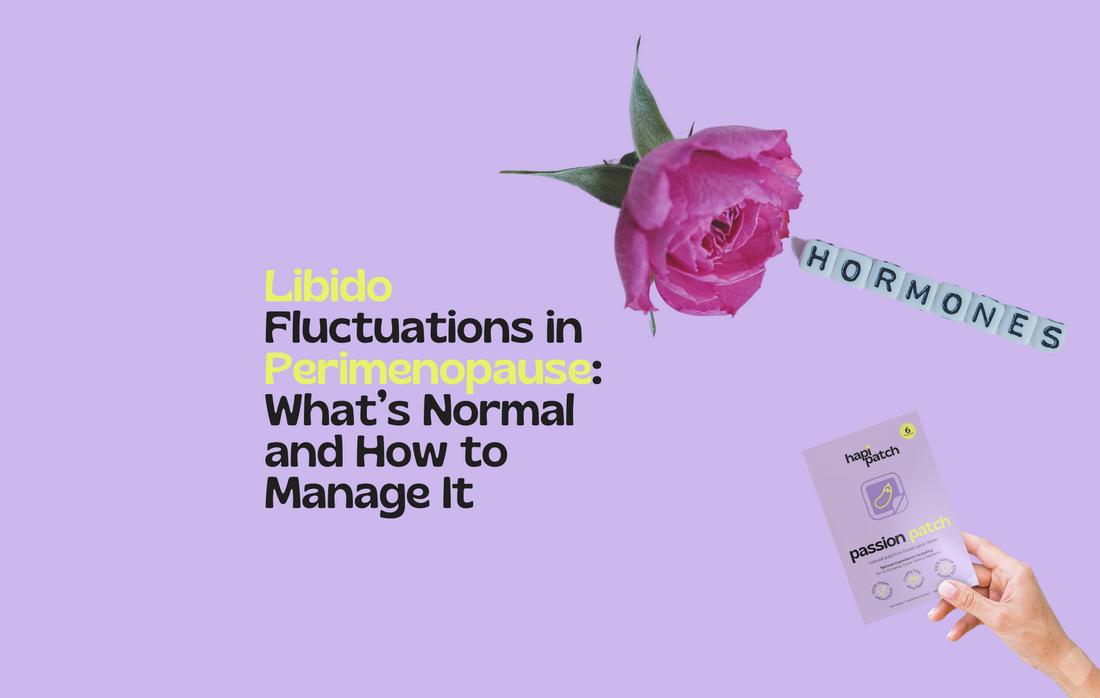Perimenopause, the transitional phase leading up to menopause, is marked by significant hormonal fluctuations that can bring about a variety of physical and emotional changes. One of the most common—and often frustrating—symptoms is a fluctuating libido. For many women, perimenopause feels like a rollercoaster when it comes to sexual desire. One day, your sex drive might feel stronger than it has in years, and the next, you might feel completely uninterested in intimacy.
While these changes can be confusing, they are entirely normal. In this blog, we’ll explore why libido fluctuates during perimenopause, the hormones responsible for these shifts, and how to manage your changing sex drive. We’ll also discuss how The Passion Patch can provide steady support for libido and hormone balance during this unpredictable time.
What’s Happening to Your Hormones During Perimenopause?
Perimenopause typically begins in a woman’s 40s but can start earlier for some. This phase can last anywhere from a few months to over a decade, and it’s characterised by unpredictable shifts in hormone production, particularly oestrogen, progesterone, and testosterone. These hormones, which regulate the menstrual cycle, sexual desire, and mood, become erratic, leading to fluctuating symptoms.
- Oestrogen
Oestrogen is the primary female sex hormone, responsible for regulating the menstrual cycle, maintaining vaginal health, and supporting libido. During perimenopause, oestrogen levels can rise and fall unpredictably, leading to irregular periods, mood swings, and changes in sexual desire. When oestrogen levels are high, women may experience an increase in libido, but when they drop, vaginal dryness and reduced interest in sex are common.
- Progesterone
Progesterone works alongside oestrogen to regulate the menstrual cycle and help maintain a stable mood. As progesterone levels fluctuate, women often experience mood swings, anxiety, or irritability—factors that can negatively affect sexual desire. Lower levels of progesterone can also lead to difficulty sleeping, which may reduce energy and libido.
- Testosterone
Testosterone is often thought of as a "male" hormone, but it’s equally important for women. Although women produce lower levels of testosterone than men, this hormone plays a crucial role in regulating libido, energy, and mood. During perimenopause, testosterone levels begin to decline, leading to reduced sexual desire and overall vitality.
Why Libido Fluctuates During Perimenopause
The erratic nature of hormone production during perimenopause is the primary reason for fluctuating libido. On days when oestrogen and testosterone levels are higher, women may feel a stronger desire for sex, while lower hormone levels can lead to a drop in sexual interest. Additionally, other perimenopausal symptoms, such as mood swings, fatigue, and anxiety, can further dampen libido.
Common Symptoms That Affect Libido During Perimenopause:
- Vaginal Dryness: As oestrogen levels fluctuate, many women experience vaginal dryness, which can make intercourse uncomfortable or painful, reducing interest in sex.
- Fatigue: Low energy levels, often caused by disrupted sleep or hormonal changes, can make it difficult to feel motivated for physical intimacy.
- Emotional Changes: Mood swings, anxiety, or feelings of irritability caused by hormonal shifts can negatively affect libido, making it harder to feel emotionally connected to a partner.
- Changes in Body Image: Many women experience changes in their bodies during perimenopause, such as weight gain or changes in skin elasticity, which can impact self-confidence and sexual desire.
Managing Libido Fluctuations Naturally
While fluctuating libido during perimenopause is entirely normal, there are ways to manage these changes and maintain a healthy sex drive. Here are some natural strategies to help stabilise libido during this time:
- Exercise Regularly
Exercise helps improve mood, increase energy levels, and support hormone balance, all of which can enhance libido. Strength training, yoga, and cardiovascular activities like walking or swimming are particularly beneficial for boosting circulation and reducing stress.
- Maintain a Balanced Diet
What you eat can play a significant role in hormone regulation. A diet rich in omega-3 fatty acids, zinc, and magnesium can support hormone production and improve energy levels. Foods like salmon, flaxseeds, pumpkin seeds, and leafy greens are excellent for promoting hormonal balance.
- Reduce Stress
Chronic stress can worsen hormonal imbalances and lower libido. Stress-relief techniques like meditation, deep breathing exercises, or yoga can help manage cortisol levels and support a healthier sex drive.
- Get Enough Sleep
Quality sleep is essential for hormone regulation. Hormonal fluctuations can disrupt sleep patterns, leading to fatigue and reduced libido. Prioritise sleep by creating a relaxing bedtime routine, limiting screen time before bed, and ensuring your sleeping environment is conducive to rest.
- Use Lubricants or Vaginal Moisturisers
If vaginal dryness is an issue, using a high-quality lubricant or vaginal moisturiser can make sex more comfortable and enjoyable. These products can help alleviate the discomfort caused by declining oestrogen levels and make it easier to maintain intimacy.
How The Passion Patch Can Help Stabilise Libido
For women looking for a natural way to stabilise their libido during perimenopause, The Passion Patch is an ideal solution. This transdermal patch delivers a blend of natural aphrodisiac ingredients directly through the skin, providing consistent support for hormonal balance and sexual desire.
Key Ingredients in The Passion Patch:
- Tribulus Terrestris: This powerful herb is known for its ability to naturally increase testosterone levels, helping to restore libido and enhance sexual desire during perimenopause.
- Ginseng Extract: Ginseng is an adaptogen that helps combat fatigue and reduce stress, making it easier to feel energised and engaged in intimacy.
- L-Arginine: L-Arginine improves blood flow, which is essential for physical arousal. By increasing circulation, this amino acid supports better sensitivity and sexual pleasure.
- Damiana Extract: Damiana is a natural mood booster that helps reduce anxiety and improve sexual function, making it easier to enjoy intimacy even during hormonal fluctuations.
The Passion Patch uses transdermal delivery technology to ensure that these ingredients are absorbed directly into the bloodstream, bypassing the digestive system for faster and more efficient results. The patch’s 4-layered matrix design allows for a steady release of ingredients over 24 hours, providing continuous libido support.
The Science Behind Transdermal Delivery
Transdermal patches, like The Passion Patch, are designed to deliver active ingredients directly through the skin, allowing them to enter the bloodstream without being broken down by the digestive system. This method ensures that the ingredients retain their potency and are absorbed more efficiently.
The gradual release of ingredients from the patch helps maintain a consistent level of support throughout the day, making it an excellent solution for stabilising libido during the unpredictable hormone shifts of perimenopause.
FAQ: Perimenopause and Libido Fluctuations
- Why does my libido fluctuate so much during perimenopause?
Libido fluctuates during perimenopause due to unpredictable hormone levels, particularly oestrogen, progesterone, and testosterone. These hormonal changes can cause shifts in sexual desire, mood, and energy levels.
- Can The Passion Patch help stabilise my libido during perimenopause?
Yes, The Passion Patch provides natural ingredients that support hormonal balance, boost testosterone levels, and improve circulation, helping to stabilise libido during perimenopause.
- What are common symptoms of perimenopause that affect libido?
Symptoms such as vaginal dryness, fatigue, mood swings, and anxiety can all affect libido during perimenopause.
- What lifestyle changes can help improve libido during perimenopause?
Regular exercise, a hormone-supportive diet, stress management, quality sleep, and the use of lubricants or vaginal moisturisers can help improve libido during perimenopause.
- How long does perimenopause last?
Perimenopause can last anywhere from a few months to over 10 years, depending on the individual. It typically begins in a woman’s 40s, but it can start earlier or later.

